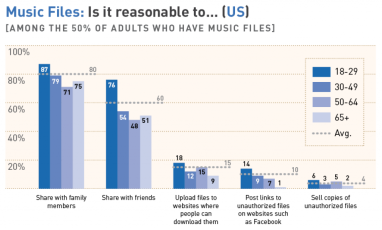In a poll taken in 2012 on Violinist.com, 74% of 351 people said that humans need music like they need shelter, food, and clothing; by definition, making music a necessity of life. The blog continues by questioning if, “a child [would] learn his or her alphabet, without a song to go with it? Perhaps, but I just haven’t happened to meet any children during my lifetime who did not learn this fundamental skill without a song to help.” A valid point made by this blogger who also agrees, music IS a necessity of life. So if music–like clothing, shelter, and food–is something that 74% of people say they can’t live without, why are there laws set in place to keep us from getting music online? Some artists have banned together to say, “let music be free.”
Some artists, however, refuse to let their music on any sites where it could be downloaded for free or even streamed. These artists and other people in the music industry claim that it affects the artists and the music industry as a whole. Amy Adkins wrote an article on Chron that claimed, “The availability of free music has cost the music industry $12.5 billion in economic losses.” Which I highly doubt but even so, it doesn’t seem to be affecting Justin Bieber too much; although that could simply be a lack of people downloading his music. A Twitter post by the popular television show “Ridiculousness”, sarcastically showed how artists claim to be affected yet live a luxurious life; one picture even shows the artist with stacks of money surrounding him.
Illegally downloading music isn’t hurting any of the artists. If anything, these artists should be flattered that their fans are willing to literally break the law just to download their song. UpVenue recorded Lady GaGa’s smug remark to the artists against free download sites which says, “You know how much you can earn off touring, right? Big artists can make anywhere from $50 million for one cycle of two years’ touring. Giant artists make upwards of $100 million.” $50 million dollars is more than most Americans will ever see in their lifetime. Downloading a couple of songs for free isn’t even going to put a dent in the artist’s millions. I’m with GaGa on this one.
